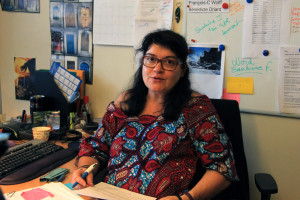Bénédicte Driard, administrative assistant for the Economic Demography research unit

What trajectory brought you to INED?
After earning a qualification in reception in a rural context, I took the BAFA (Brevet d’Aptitude aux Fonctions d’Animateur) and a qualification in first aid and lifesaving and became a counsellor and activities supervisor for schoolchildren on their classes vertes and classes de neige (long spring and winter fieldtrips). I also did all kinds of odd jobs. Then I decided I wanted to change directions and find a job in Paris, so I took an IT training program. That’s how I discovered INED—I did my practical training period here. I was lucky, they liked my work! I stayed on as an assistant in the personnel department, and then took and passed a recruitment competition for a permanent position. I’ve been working at INED for 21 years now and thanks to the internal mobility arrangements I’ve been able to work in several departments, including the office of the General Secretary and the Facilities, logistics, health and safety department.
What kind of work do you do at INED?
Since 2008 I’ve been working in the UR9 research unit, Economic Demography. I’m the assistant for the entire unit, which has nearly twenty researchers and doctoral students.
My job involves a series of fairly diverse tasks, ranging from classic secretarial tasks to setting up and keeping tabs on research project budgets. I also handle travel and mission assignments as well as expense receipts for researchers participating in colloquia and seminars abroad. Another of my tasks is to welcome guest researchers and contract workers. The Eco-Demo unit moves around a lot; it’s a very young, dynamic team. As unit assistant I partake in the life of the unit, I know all the topics the researchers are working on. We’re used to working together and relations are good, which facilitates communication. The researchers manage their own appointments, etc. They’re independent and so am I.
Over the years the job has changed. When I first arrived, the unit had about 10 researchers. Since then it’s doubled in size and the administrative tasks have become heavier and more complex. Because the newcomers are from all sorts of different backgrounds, the work has become more diverse. The job varies by research unit, of course. In mine I work more organizing colloquia, such as the Conference on Divorce, which will be held in October 2014. I’m primarily in charge of logistics (online enrolment, organization, buffets, etc.). You have to stick to the budget allocated for each expense category and you need to remain in contact with the various event partners.
What do you appreciate most at INED?
Working for a research institute opens your mind. For the last six years I’ve been steeped in demography. I particularly like the friendly atmosphere in my unit. And yet economic demography is the last area I would have chosen—I’ve always hated math, and their studies are always full of mathematical formulas! Last December I was very proud to attend a thesis defence of a unit doctoral student, the first defence by one of the students who were here when I arrived. But since the unit keeps hosting more and more students, I wonder how I’ll be able to attend all the defences.
